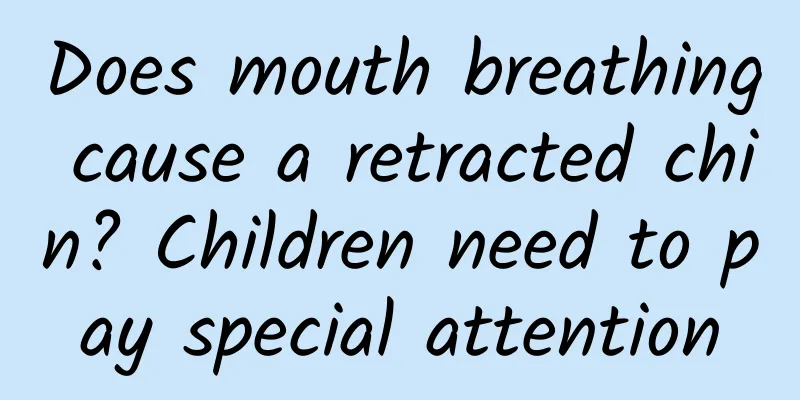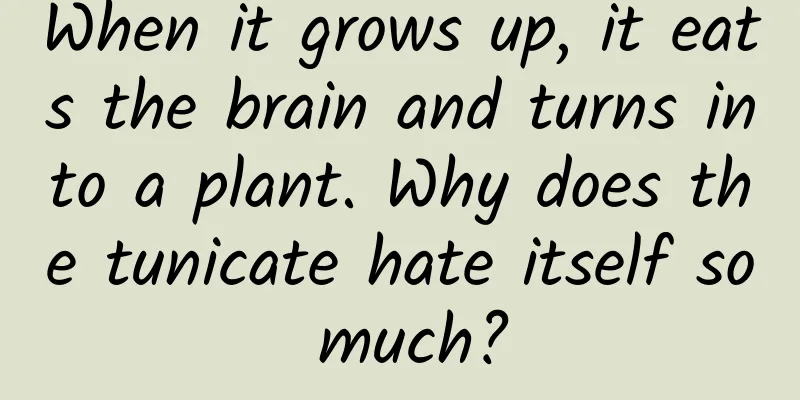Does mouth breathing cause a retracted chin? Children need to pay special attention

|
Review expert: Peng Guoqiu, deputy chief physician of the Fourth Medical Center of the General Hospital of the Chinese People's Liberation Army Many people have heard of the sayings that habitual mouth breathing may affect one's appearance? A receding chin is a characteristic of "adenoid facies". Some people believe that this phenomenon is more prominent in children and adolescents because their facial bones and soft tissues are in the development stage. Why does mouth breathing occur? Mouth breathing is the abbreviation of breathing with the mouth open during sleep. Normally, the human body breathes through the nasal cavity. However, children are prone to upper airway diseases, which can cause partial or complete obstruction of the nasal cavity and reflexive mouth breathing. What you need to focus on when breathing from the mouth is not the "opening of the mouth" itself, but the "stuffy nose". You need to find and solve the cause of the "stuffy nose". It is reported that the incidence of mouth breathing in children ranges from 4.3% to 45.9%. In theory, any factor that causes upper airway obstruction can be the cause of mouth breathing, such as rhinitis, hypertrophy of nasal concha, deviated nasal septum, nasal polyps, hypertrophy of tonsils, hypertrophy of adenoids, etc. Among them, hypertrophy of tonsils and hypertrophy of adenoids are the most common causes of mouth breathing in children. What is adenoid hypertrophy? Adenoids are a type of lymphatic tissue similar to tonsils, also known as pharyngeal tonsils. They are located at the end of the nasal cavity, above the mouth, in a place called the nasopharynx, and are shaped like half an orange. Adenoids exist at birth, grow most obviously at the age of 6 to 7, and gradually shrink after the age of 10. It is part of the human immune system and helps the body defend against invading bacteria and viruses, and plays an important role in fighting respiratory infections. Sometimes it can also grow and enlarge due to repeated infections or overactivity. Although enlarged adenoids cannot be seen directly, they will form an "adenoid facies" on the face. Image source: Science Popularization China Enlarged adenoids cause long-term mouth breathing, and the airflow impacts the hard palate, resulting in a characteristic facial appearance such as elongated maxilla, retracted chin, high arched hard palate, uneven and protruding teeth, and thick lips, which is called adenoid facies. Adenoid facies are not necessarily caused entirely by adenoid hypertrophy. Chronic rhinitis and tonsil hypertrophy can also lead to mouth breathing and adenoid facies. Family heredity and personal development can also affect the face. What should we do if children breathe through their mouths? If you suspect your child has mouth breathing, it is recommended that you visit an ENT department for a comprehensive evaluation by a specialist. The doctor will ask about the medical history in detail, especially the sleep-related conditions, and conduct a comprehensive physical examination, focusing on the nasal cavity, posterior pharyngeal wall, tonsils, etc. If necessary, nasopharyngeal endoscopy, polysomnography and other examinations will be performed to provide a comprehensive diagnosis and treatment advice. Mouth breathing ≠ enlarged adenoids Adenoid hypertrophy is the most common cause of mouth breathing in children, but even though it is common, it is not the only cause. Other mucosal causes such as allergic rhinitis and chronic sinusitis are also increasing in incidence among children year by year. We must analyze the causes of mouth breathing and carry out targeted treatment based on the causes to achieve the best results, rather than just focusing on adenoids hypertrophy. Adenoids hypertrophy ≠ adenoidectomy If it is diagnosed that mouth breathing is indeed caused by adenoids hypertrophy, adenoidectomy is not necessarily required immediately. Adenoidectomy has its corresponding surgical indications. If a child holds his breath as soon as he lies down, cannot sleep at all, and has recurrent sinusitis and otitis media due to enlarged adenoids, adenoidectomy is recommended; but if the enlarged adenoids have not caused severe nasal congestion and has not caused recurrent infections, conservative treatment can be considered first. If conservative treatment is ineffective, adenoidectomy can be considered. In short, if you find that your child always breathes through the mouth, you must not turn a blind eye, but don't be overly anxious. A specialist will evaluate and find out the cause of mouth breathing, and provide targeted treatment so that your child can grow up beautifully and healthily. |
<<: The “white spots” that brought the cultural relics back to life are actually plaster?
>>: How many forests and grasslands have “disappeared” in China over the past thousand years?
Recommend
Tips and tricks for Sunshine Pig Farm: How much money can you make in a day at Sunshine Pig Farm?
Dongguan editor Feng Chao has previously introduc...
Foot Reflexology: Chen Bingle's Traditional Chinese Medicine Foot Reflexology Course
Foot Reflexology: Chen Bingle's Chinese Medic...
B station’s promotion beyond the circle!
On the road to breaking out of the circle, if Bil...
There are too many leftovers during the Spring Festival! How to deal with them safely?
During the Chinese New Year, people naturally enj...
3GB/6GB GTX 1060 comparison test: the gap is amazing
Currently, the price range of GTX 1060 discrete g...
One man guards the pass, ten thousand men cannot open it: the small mouth actually hides such a complex ecological environment
Open your mouth in front of the mirror and look a...
The Lantern Festival is coming, how to write copy that takes advantage of the situation?
It’s the Lantern Festival again. Have you thought...
How to achieve fission growth? 6 tips!
The current environment tests entrepreneurial tea...
How to develop an online event planning plan?
Even those who are just starting out in operation...
Chery Fengyun T9 and BYD Song L DM-i, which one is more worth buying?
On October 13, Chery announced the launch of its ...
Android's use of Java infringes Oracle's copyright? Google may pay $8.8 billion
Google and Oracle are nearing the end of a years-...
APP promotion: 95% of people use these 5 conversion strategies incorrectly
The conversion rate optimization strategy is inef...
How to create a popular WeChat mini-program mall?
Nowadays, many brands have become popular with th...
Can the rising power of AI in the television industry open up new imagination space?
After experiencing a golden period of rapid devel...
Will taking a bath or exercising after having sex make the condition worse? Many people ignore these 4 things
I avoided the first day but couldn't avoid th...









